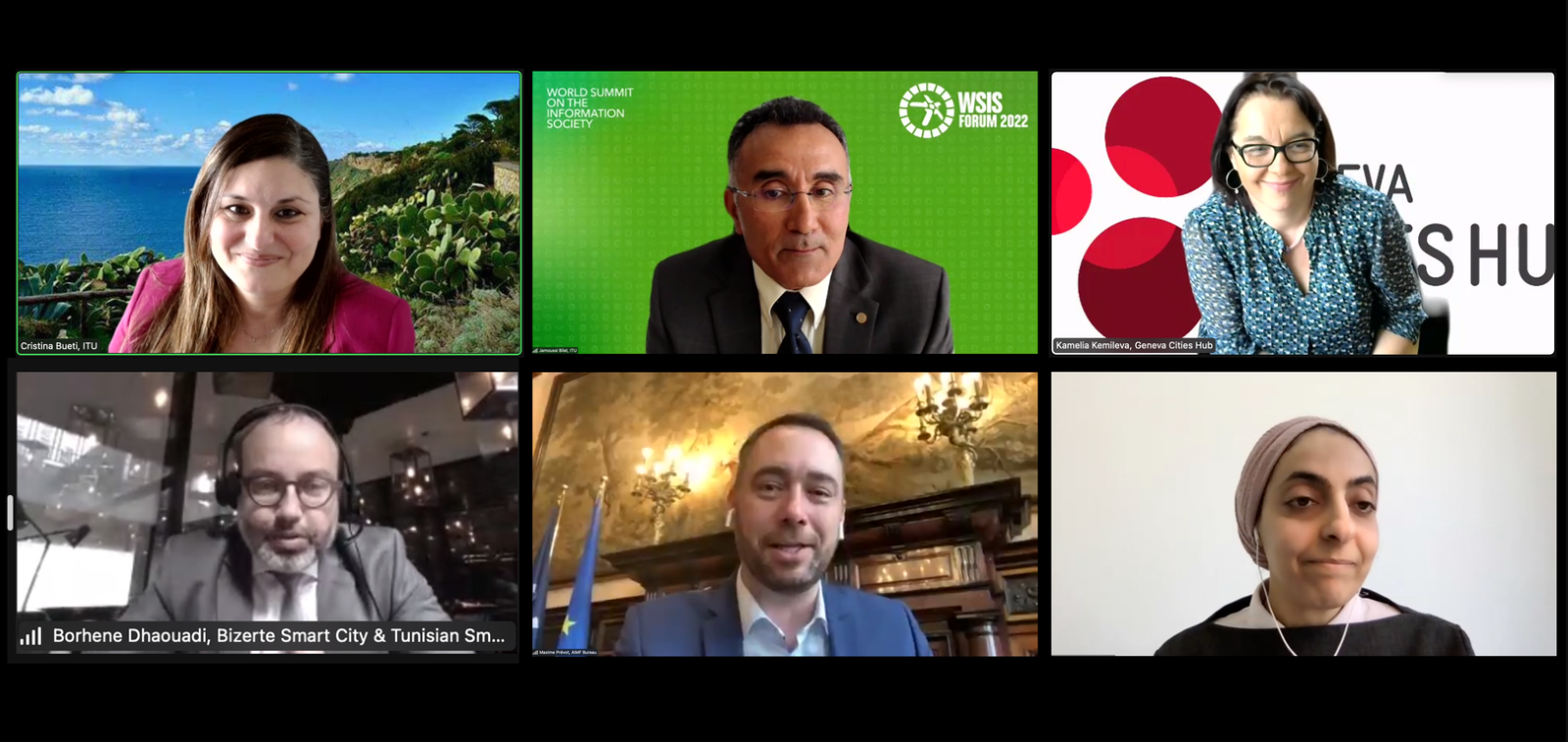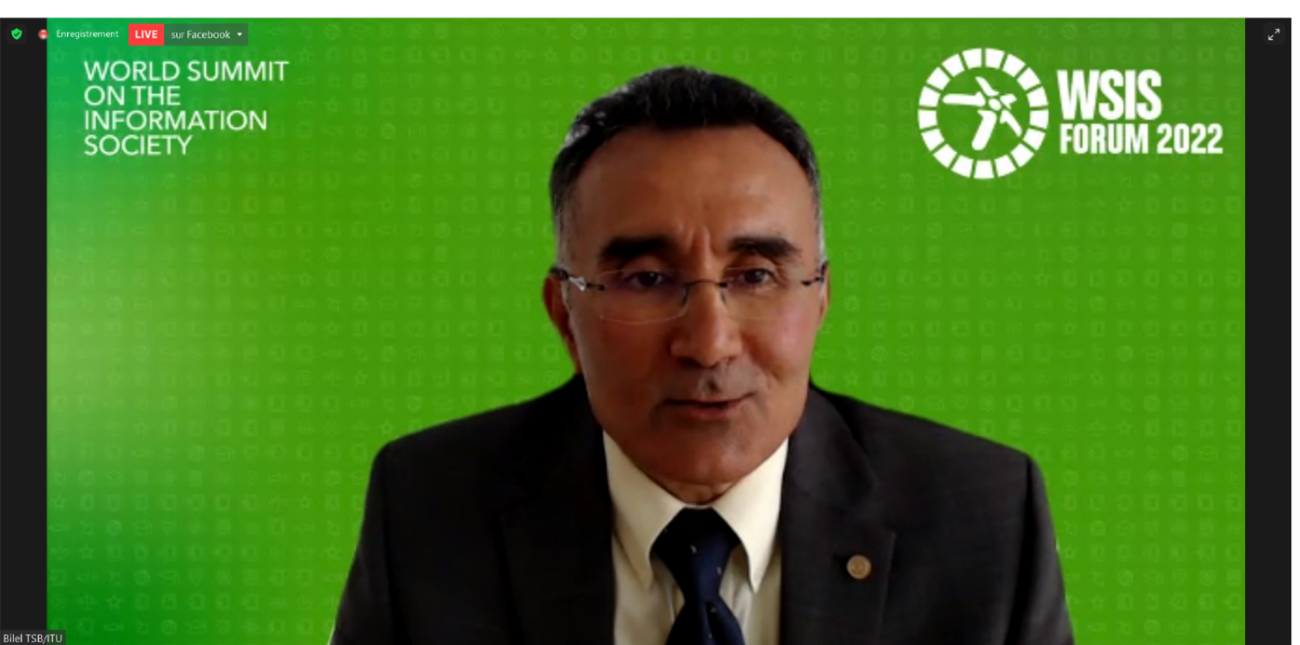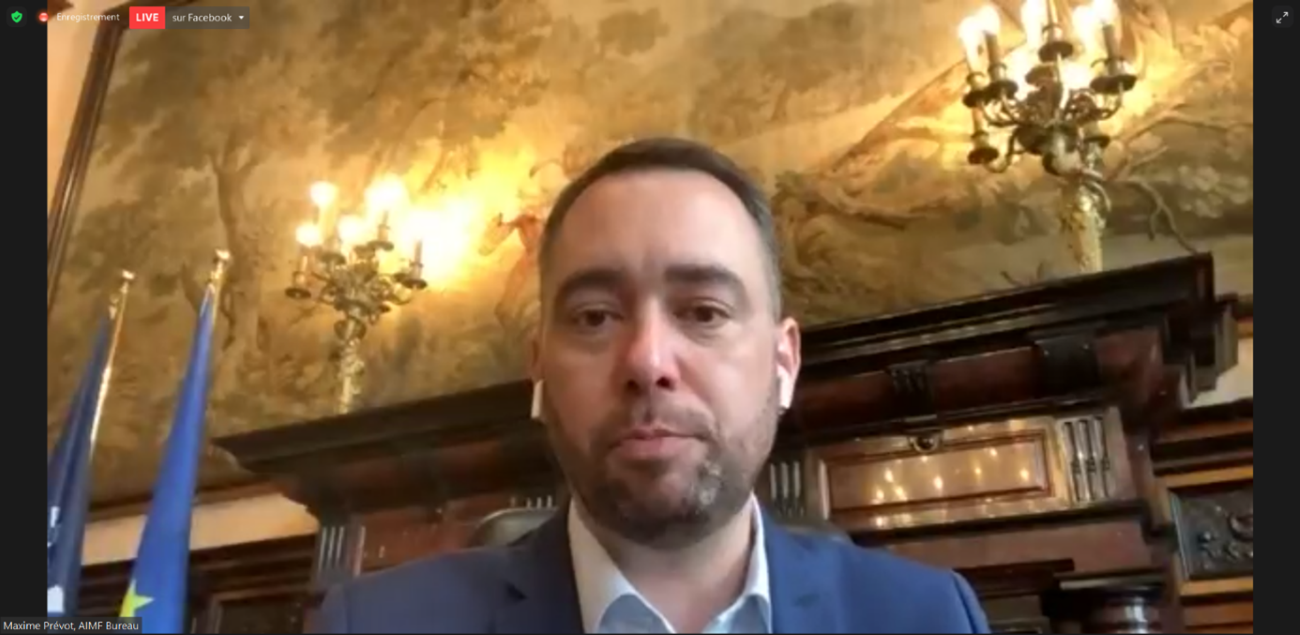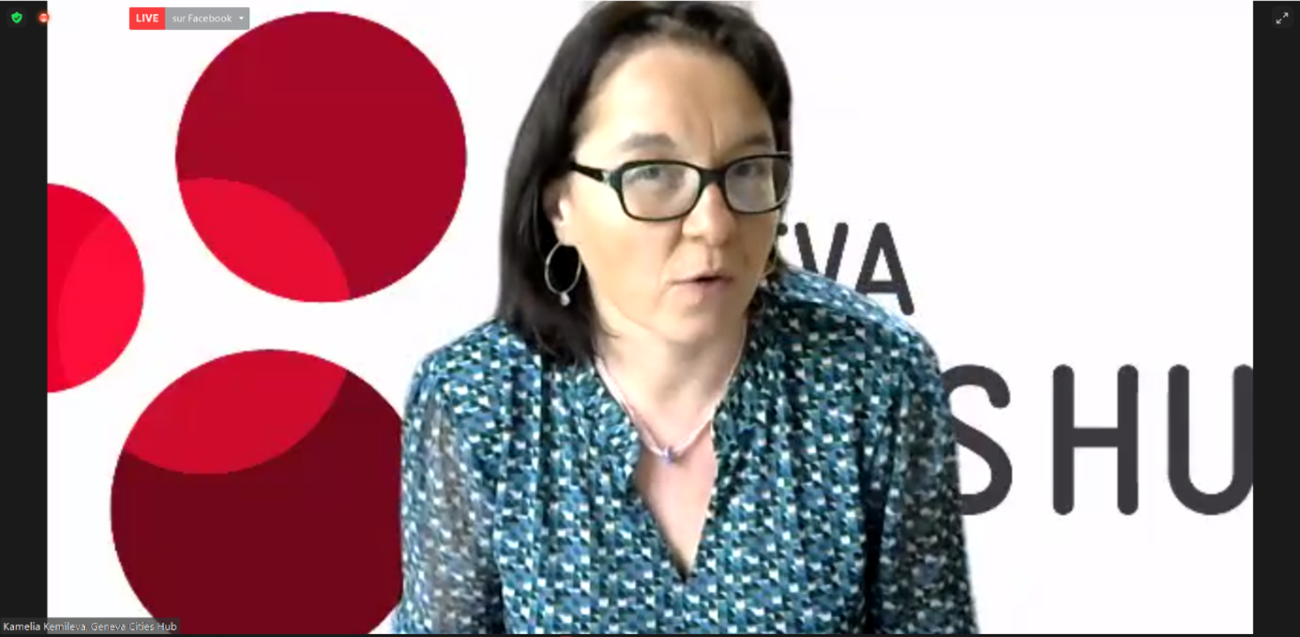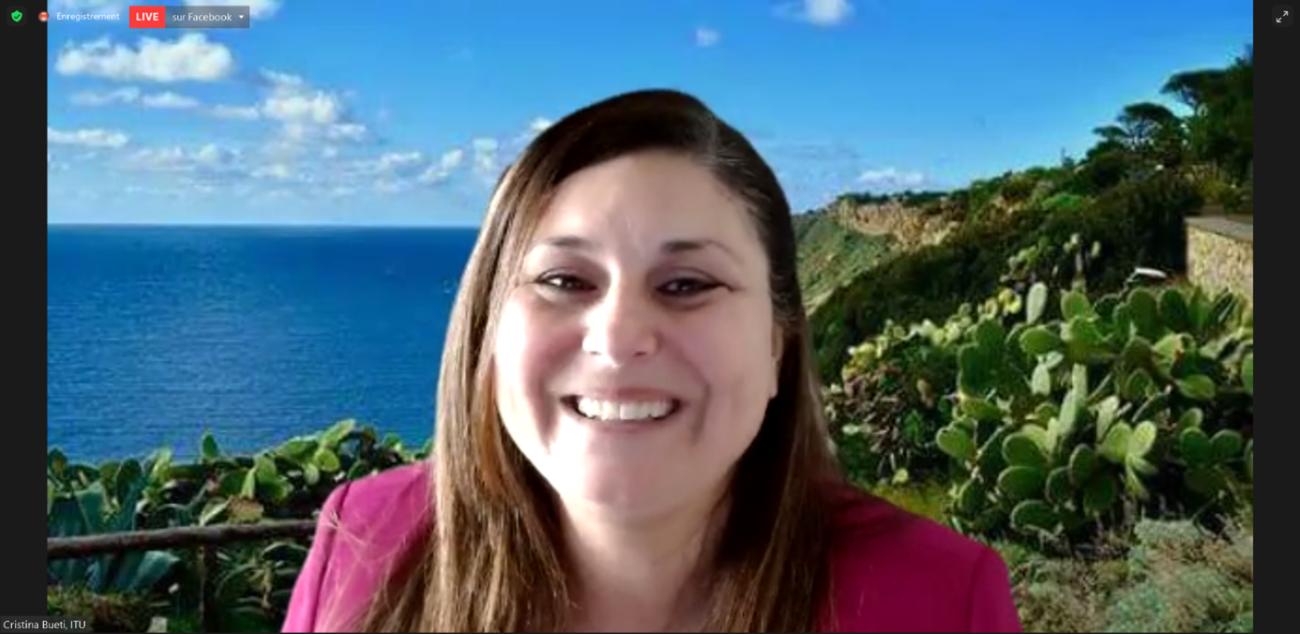Towards People-Oriented Cities
International Telecommunication Union, Geneva Cities Hub and United Nations University
Session 201
The world is rapidly urbanizing, with more than 50 percent of the world’s population living in urban areas. At the same time, the world is quickly becoming more digital. Data, artificial intelligence, and connectivity are shaping the future of our cities and societies.
Digital transformation is increasingly becoming a focus of strategic thinking and planning of many cities and communities. It emphasizes how digital services and applications will change and transform citizens' experience of life and well-being. Digital technologies have the potential to serve people, improve public services and help cities on their path to becoming smarter and more sustainable. Smart sustainable people-oriented cities can be an inclusive force for good and have a tremendous positive impact on people’s lives.
This session aims to raise awareness on the significant role that digital transformation can play in building people-oriented cities. The session will look at how international standards are helping cities become more people-oriented while also meeting the ambitious climate targets set out by the 2030 Agenda, the Paris Agreement and the Sustainable Development Goals.
Join these experts while they highlight specific use cases of how digital technologies can be harnessed to drive development towards people-oriented cities today and tomorrow.
This workshop will be held in French with English interpretation.
PROGRAMME
11:45 – 11:55 Opening remarks:
- Bilel Jamoussi, Chief of Study Groups, TSB, ITU
- Maxime Prévot, Deputy Mayor of Namur and member of the AIMF Bureau
11:55 – 12:40 Session 1: Towards People-Oriented Cities
Moderator: Kamelia Kemileva, Director, Geneva Cities Hub
Speakers:
- Cristina Bueti, Counsellor and ITU Focal Point on Environment & Smart Sustainable Cities
- Alexandre Bosshard, Coordinator and Project Manager, Pully, Switzerland
- Soumaya Ben Dhaou, Research coordinator, UNU-EGOV
- Borhene Dhaouadi, President, Bizerte Smart City & Tunisian Smart Cities; Mediterranean Director Development, Setec International
Questions & Answers
12:40 – 12:45 Closing remarks:
- Bilel Jamoussi, Chief of Study Groups, TSB, ITU
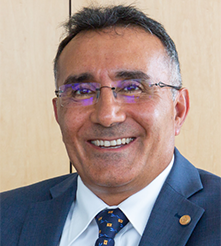
Tunisian born, Dr. Bilel Jamoussi is Chief of the Study Groups Department of ITU Standardization Bureau in Geneva Switzerland. Since 2010, he has been leading the bureau’s standards making activities into a new era characterized by rapid convergence and the need for increased collaboration with vertical sectors and partnership between developed and developing countries. Prior to 2010, Jamoussi worked for a Telecommunication equipment and solutions provider for 15 years in Canada and then in the United States where he held several leadership positions and was granted 22 US patents in diverse areas including packet, optical, wireless, and quality of service. He holds a BSc, MSc and PhD degrees in Computer Engineering from the Pennsylvania State University, USA. He is fluent in Arabic, French, and English and speaks some Spanish and German.
Un ingénieur distingué, leadeur et diplomate; un expert en normalisation multilingue et titulaire de 22 brevets, Dr. Bilel Jamoussi, d’origine tunisienne, est le Chef du Département des Commissions d'Études du Bureau de la Normalisation de l'UIT (TSB) à Genève, Suisse, depuis 2010.
Il a dirigé la coordination des activités du Bureau en matière de normalisation dans une nouvelle ère caractérisée par la transformation numérique, qui nécessite une collaboration accrue avec des secteurs verticaux tels que la santé, les transports, les services publics et les finances.
Avant 2010, il a travaillé dans le secteur privé pendant 15 ans et a occupé des postes de cadre supérieur, notamment celui de directeur des normes pour Nortel.
Il est titulaire d'une licence, d'une maîtrise et d'un doctorat en génie informatique de la Pennsylvania State University, aux États-Unis. Bilel a vécu en Tunisie, au Canada, aux États-Unis et en Suisse, ce qui lui donne un point de vue mondial unique. Il parle couramment l'arabe, le français et l'anglais et parle un peu l'espagnol et l'allemand.

Maxime Prévot graduated in Political Science, majoring in Public Affairs, at the Catholic University of Louvain, then in Law and in the management of new information and communication technologies at the University of Namur.
He began his career as a consultant in organizational performance of public institutions at PricewaterhouseCoopers.
Attracted to politics at a very young age, he became political director of the presidency of his party at the age of 26 and was elected Mayor of Namur in 2012, at the age of 34, after having been Deputy Mayor for 6 years.
Federal Deputy from 2007 to 2009, then Walloon Deputy, he became, in 2014, Vice-President of the Walloon Government and Minister in charge of Public Works, Health, Social Action and Heritage.
In June 2017, he left his post as Walloon Vice-President to devote himself to his city as Deputy – Mayor. In October 2018, he was largely re-elected Mayor of the Walloon Capital.
In January 2019, Maxime Prévot was elected President of his political party, the Center Démocrate Humaniste (cdH), which in March 2022 became “Les Engagé es”. In May 2019, he left the Parliament of Wallonia and joined the House of Representatives.
Maxime Prévot est diplômé en Sciences politiques, orientation Affaires publiques, à l’Université Catholique de Louvain, puis en Droit et en gestion des nouvelles technologies de l’information et de la communication à l’Université de Namur.
Il entame son parcours professionnel comme consultant en performance organisationnelle des institutions publiques au sein de PricewaterhouseCoopers.
Attiré très jeune par la politique, il devient directeur politique de la présidence de son parti à 26 ans et est élu Bourgmestre de Namur, en 2012, à 34 ans, après avoir été Adjoint au maire pendant 6 ans.
Député fédéral de 2007 à 2009, ensuite Député wallon, il devient, en 2014, Vice-Président du Gouvernement wallon et Ministre en charge des Travaux publics, de la Santé, de l’Action sociale et du Patrimoine.
En juin 2017, il quitte son poste de Vice-Président wallon pour se consacrer à sa ville comme Député – Bourgmestre. En octobre 2018, il est largement réélu Bourgmestre de la Capitale wallonne.
En janvier 2019, Maxime PREVOT est élu Président de son parti politique le centre démocrate Humaniste (cdH) , devenu en mars 2022 « Les Engagé·es ».
En mai 2019, il quitte le Parlement de Wallonie et rejoint la Chambre des Représentants.
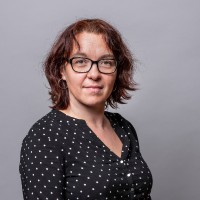
Kamelia, holding an MBA, has in-depth experience in executive administration of non-profit organisations. She is also a lawyer, specialized in Swiss law relevant to international organisations and international public law, including expertise on the United Nations intergovernmental bodies.
Before joining the Geneva Cities Hub, Kamelia was namely Executive Manager at the Geneva Academy. Before this she worked as Special Assistant to the President of the UN Human Rights Council for three years. She was also a Visiting Programme Director at Wilton Park. Previously to that, she also worked at the Swiss Ministry of Foreign Affairs and the Permanent Mission of Switzerland to the UN Office at Geneva. In 2002, she was part of the Office of the UN High Commissioner for Human Rights in New York.
Kamelia, titulaire d'un MBA, possède une expérience approfondie de l'administration exécutive d'organisations à but non lucratif. Elle est également avocate, spécialisée dans le droit suisse pertinent pour les organisations internationales et le droit public international, y compris une expertise sur les organes intergouvernementaux des Nations Unies.
Avant de rejoindre le Geneva Cities Hub, Kamelia était notamment Executive Manager à la Geneva Academy. Auparavant, elle a travaillé comme assistante spéciale du président du Conseil des droits de l'homme des Nations Unies pendant trois ans. Elle a également été directrice du programme invité à Wilton Park. Auparavant, elle a également travaillé au ministère suisse des Affaires étrangères et à la Mission permanente de la Suisse auprès de l'Office des Nations Unies à Genève. En 2002, elle faisait partie du bureau du Haut-Commissariat des Nations Unies aux droits de l'homme à New York.
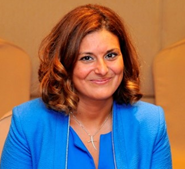
Cristina Bueti is the ITU Focal Point on Environment and Smart Sustainable Cities. She is also the Counsellor of ITU-T Study Group 20 “Internet of things (IoT) and smart cities and communities (SC&C)” at the International Telecommunication Union (ITU). She also serves as TSB/ITU focal point for Latin America. Cristina Bueti graduated from the Faculty of Political Science, Law and International Cooperation and Development of the University of Florence, where she completed postgraduate studies in International Cooperation and Telecommunications Law in Europe. She also holds a specialization in Environmental Law with a special focus on Telecommunications. In 2003, Ms. Bueti built on her academic credentials by completing a specialized course in peace keeping and international cooperation with special focus on telecommunications at the Faculty of Laws, University of Malta, before joining the International Telecommunication Union in Geneva in January 2004. As part of the International Women's Day 2016, she was named as one of the twenty Geneva-based inspirational women working to protect the environment. She has authored over 40 reports on telecommunication issues. A native Italian speaker, Cristina is also fluent in English, French and Spanish.
Mme Cristina Bueti est la coordonnatrice pour l'environnement et les villes intelligentes et durables à l'UIT. Elle est également la Conseillère de la Commission d'études 20 de l'UIT-T (Internet des objets (IoT) et villes et communautés intelligentes (SC&C)) au sein de l'Union internationale des télécommunications (UIT). En outre, elle est la coordonnatrice du TSB de l'UIT pour l'Amérique latine.
Mme Cristina Bueti est diplômée de la Faculté de sciences politiques, de droit et de coopération et développement internationaux de l'Université de Florence, où elle a suivi des études de troisième cycle dans le domaine de la coopération internationale et du droit des télécommunications en Europe. Elle est également titulaire d'une spécialisation en droit environnemental, orientée en particulier vers les télécommunications.
En 2003, Mme Bueti a complété ses titres universitaires en suivant un cours spécialisé sur le maintien de la paix et la coopération internationale, orienté en particulier vers les télécommunications, à la Faculté de droit de l'Université de Malte, avant d'entrer à l'Union internationale des télécommunications à Genève en janvier 2004.
Dans le cadre de la Journée internationale des femmes de 2016, elle a été désignée comme l'une des vingt femmes en poste à Genève qui montrent la voie dans le domaine de la protection de l'environnement.
Elle est l'auteur de plus de 40 rapports sur des questions relatives aux télécommunications. De langue maternelle italienne, Cristina parle aussi couramment l'anglais, le français et l'espagnol.
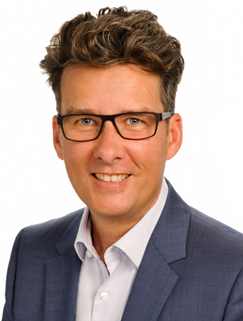
Alexandre Bosshard is a member of the head of the Department for industrial services and technical office of the City of Pully. Coordinator of this department and passionate about the projects that make the link between human and technical aspects, he holds a master degree in engineering from the Swiss Federal Institute of Technology in Lausanne (EPFL), a postgraduate in applied psychology SNLP and a certificate in public administration management from the University of Lausanne. Alexandre has also worked for several private companies and organizations for which he has carried out numerous projects in Switzerland and abroad in the field of large infrastructures, environment and geomatic. With more than 20 years of practice in complex and cross-functional projects, he has piloted several smart city projects in the fields of big data, mobility, e-government and open source. He leads the implementation in the City of Pully of the U4SSC KPI’s, according to the method developped by the International Telecommunication Union (ITU) and initiated and piloted the writing of "Pully under the microscope".
M. Alexandre Bosshard est membre de la direction du Département des services industriels et du bureau technique de la ville de Pully. Il est le coordonnateur de ce Département et se passionne pour les projets qui font le lien entre les aspects humains et techniques. Il est titulaire d'un mastère en ingénierie de l'École polytechnique fédérale de Lausanne (EPFL), d'un diplôme de troisième cycle en psychologie appliquée de la Société de programmation neurolinguistique (SNLP) et d'un certificat en administration publique de l'Université de Lausanne. Il a aussi travaillé avec plusieurs entreprises et organisations privées, pour lesquelles il a mené à bien de nombreux projets en Suisse et à l'étranger dans le domaine des grandes infrastructures, de l'environnement et de la géomatique. Fort de plus de 20 ans d'expérience dans le cadre de projets complexes et transversaux, il a piloté plusieurs projets de villes intelligentes dans les domaines des mégadonnées, de la mobilité, de l'administration publique en ligne et des solutions à code source ouvert. Il dirige la mise en œuvre des indicateurs fondamentaux de performance de la ville de Pully dans le cadre de l'initiative "Tous unis pour des villes intelligentes et durables", selon la méthode établie par l'Union Internationale des Télécommunications (UIT) et a lancé et dirigé la rédaction du rapport "Pully à la loupe".

Soumaya Ben Dhaou is Research Coordinator at the United Nations University Operating Unit on Policy-driven Electronic Government (UNU-EGOV), a think-tank devoted to multidisciplinary research on how digital transformation may contribute to empowered democratic citizenship trustworthy public infrastructures, more inclusive societies and sustainable development. She also acts as an International consultant for UNDP providing advisory services in several countries. She is also a professor of Digital Governance and ICT at the University of Minho in Portugal.
She is coordinating research in the field of Digital Transformation and Emerging technologies for Government and public sector" and research on "Smart cities" including Blockchain IoT, Artificial Intelligence, Data analytics and their impact on transforming urban centres and settlements, smart cities and communities, and more broadly Government and public service. She led the "Blockchain4Cities" report in "United for Smart Sustainable Cities" (U4SSC).
Soumaya was previously a professor at Nipissing Northern Ontario University. She holds a PhD in Information Systems and Technology from the joint PhD program of Concordia University, HEC Montreal and McGill University and the University of Quebec in Montreal co-directed with Paris-Dauphine University in France.
Mme Soumaya Ben Dhaou est coordonnatrice de recherche à l'Unité opérationnelle de l'Université des Nations Unies sur le gouvernement électronique axé sur les politiques (UNU-EGOV), un groupe de réflexion consacré à la recherche multidisciplinaire sur la façon dont la transformation numérique peut contribuer à une citoyenneté démocratique renforcée, à des infrastructures publiques fiables et à des sociétés plus inclusives et développement durable. Elle agit également en tant que consultante internationale pour le PNUD, fournissant des services consultatifs dans plusieurs pays. Elle est également professeur de gouvernance numérique et TIC à l'Université de Minho au Portugal.
Elle coordonne la recherche dans le domaine de la transformation numérique et des technologies émergentes pour le gouvernement et le secteur public et la recherche sur les "villes intelligentes", y compris l'IoT Blockchain, l'intelligence artificielle, l'analyse des données et leur impact sur la transformation des centres urbains et des établissements, des villes et communautés intelligentes, et plus largement Gouvernement et service public. Elle a dirigé le rapport "Blockchain4Cities" dans "United for Smart Sustainable Cities" (U4SSC).
Soumaya était auparavant professeure à l'Université Nipissing Northern Ontario. Elle est titulaire d'un doctorat en systèmes et technologies de l'information du programme de doctorat conjoint de l'Université Concordia, HEC Montréal et l'Université McGill et de l'Université du Québec à Montréal co-dirigé avec l'Université Paris-Dauphine en France.
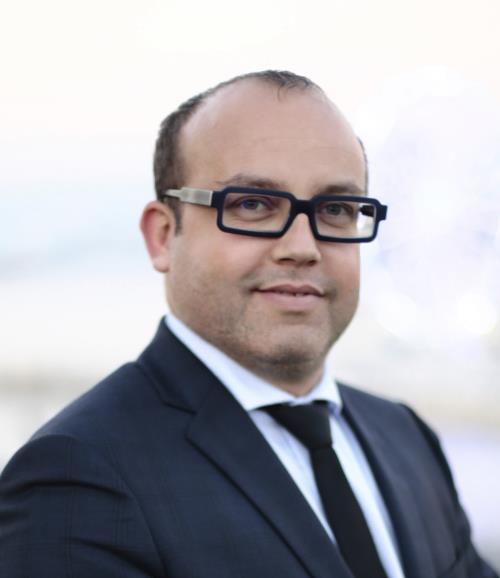
Borhene Dhaouadi, was born on 1 March 1980 in Bizerte, Tunisia. He is a Franco-Tunisian architect / urban planner, former Project Manager within the COPLAN Ingénierie Group, then in Marseille Architecture Partners and Manager of the DTA Group - Multidisciplinary Research Department since 2009. He is also president of the association Bizerte 2050 since 2011. After a Professional Diploma in Marine Carpentry and Architecture studies at the National School of Architecture of Marseille Luminy and then a Professional Master in Real Estate and Urban Policies to the Marseille Business School (Euromed), he joined in 2008, COPLAN Engineering Group through its subsidiary RTA and in 2009, they created the DTA Groupement in Tunisia with Renaud and Bernard Tarrazi, in which he becomes in a year Managing partner. He returned to the community after five years as treasurer at the Student Office of the National School of Architecture in Marseille (BDE) through the foundation in 2011 of the Association Bizerte 2050, which he is the President of. Since 2012, he has organized and led thematic workshops on the inclusive development of Northern Tunisia through strategic studies related to regional planning and the planning of economic infrastructures and modern transport in the north of the country on the principles of pooling of equipment and services, in partnership with the North East Chamber of Commerce (CCINE). In 2017, he launched the "Bizerte Smart City" Program with partners in institutional, legislative, professional and academic circles under the aegis of an Organizing Committee entitled: "Bizerte Sustainable City" of which he is the president. Under the direction of Borhene Dhaouadi, the Bizerte Smart City Program is moving forward since its launch in April 2017 with great steps to create in Bizerte an Ecosystem specializing in Smart Cities and Renewable Energies Unique of its kind in Tunisia and Africa through a 30-year city transformation program. The administrative and legal mechanisms associated with this approach are being studied by Borhene and its partners and will be part of a strategic document entitled "Bizerte Smart City 2050" which will be elaborated in consultation with the new municipal team after the Tunisian municipal elections scheduled for May 2018. The month of April 2018, Borhene prepared the launch of a National program entitled / Tunisian Smart Cities with the objective of making Tunisia the largest "Smart City" laboratory in Africa.
M. Borhene Dhaouadi est né le 1er mars 1980 à Bizerte (Tunisie). Cet architecte-urbaniste franco-tunisien, a exercé les fonctions de Chef de projet au sein du groupe COPLAN Ingénierie, puis de l'entreprise Marseille Architecture Partners, et est responsable du groupe DTA – Bureau d'études pluridisciplinaires depuis 2009. Depuis 2011, il est également Président de l'association Bizerte 2050. Après avoir obtenu un Diplôme professionnel de charpentier de marine et suivi des études d'architecture à l'École nationale d'architecture de Marseille Luminy puis un mastère professionnel en politiques immobilières et urbaines à l'École de Commerce de Marseille (Euromed), il est entré dans le Groupe COPLAN Ingénierie, par l'intermédiaire de sa filiale RTA, en 2008. En 2009, le Groupe crée le Groupement DTA en Tunisie, en collaboration avec Renaud et Bernard Tarrazi, au sein duquel M. Dhabouadi s'est hissé à la fonction d'associé directeur en l'espace d'un an. Ayant exercé pendant cinq ans la fonction de trésorier au sein du Bureau des étudiants (BDE) de l'École nationale d'architecture de Marseille, il est revenu au milieu associatif lors de la création, en 2011, de l'Association Bizerte 2050, dont il est le Président. Depuis 2012, il organise et anime des ateliers thématiques sur le développement inclusif de la région nord de la Tunisie, en menant à bien des études stratégiques sur l'aménagement du territoire et la planification des infrastructures économiques et des infrastructures de transport modernes dans le nord du pays, en se fondant sur les principes de la mutualisation des équipements et des services, en partenariat avec la Chambre de commerce et d'industrie du nord-est (CCINE). En 2017, il a lancé le programme "Bizerte Smart City", au côté de partenaires issus des milieux institutionnels, législatifs, économiques et universitaires, sous l'égide d'un comité d'organisation baptisé "Bizerte Sustainable City", dont il est le Président. Sous sa direction, le programme Bizerte Smart City progresse à grands pas depuis son lancement en avril 2017, l'objectif étant de créer, à Bizerte, un écosystème spécialisé dans les villes intelligentes et les énergies renouvelables unique en son genre en Tunisie et en Afrique, dans le cadre d'un programme de transformation de la ville sur 30 ans. Borhene et ses partenaires étudient actuellement les mécanismes administratifs et juridiques associés à ce programme, lesquels seront présentés dans un document stratégique intitulé "Bizerte Smart City 2050", qui sera élaboré en concertation avec la nouvelle équipe municipale après les élections municipales tunisiennes prévues en mai 2018. En avril 2018, Borhene a préparé le lancement d'un programme national, intitulé "Tunisian Smart Cities", dont le but est de faire de la Tunisie le plus grand laboratoire de villes intelligentes en Afrique.
-
 C1. The role of governments and all stakeholders in the promotion of ICTs for development
C1. The role of governments and all stakeholders in the promotion of ICTs for development
-
 C2. Information and communication infrastructure
C2. Information and communication infrastructure
-
 C3. Access to information and knowledge
C3. Access to information and knowledge
-
 C5. Building confidence and security in use of ICTs
C5. Building confidence and security in use of ICTs
-
 C7. ICT applications: benefits in all aspects of life — E-government
C7. ICT applications: benefits in all aspects of life — E-government
-
 C7. ICT applications: benefits in all aspects of life — E-environment
C7. ICT applications: benefits in all aspects of life — E-environment
-
 C10. Ethical dimensions of the Information Society
C10. Ethical dimensions of the Information Society
-
 C11. International and regional cooperation
C11. International and regional cooperation
-
 Goal 3: Ensure healthy lives and promote well-being for all
Goal 3: Ensure healthy lives and promote well-being for all
-
 Goal 8: Promote inclusive and sustainable economic growth, employment and decent work for all
Goal 8: Promote inclusive and sustainable economic growth, employment and decent work for all
-
 Goal 9: Build resilient infrastructure, promote sustainable industrialization and foster innovation
Goal 9: Build resilient infrastructure, promote sustainable industrialization and foster innovation
-
 Goal 11: Make cities inclusive, safe, resilient and sustainable
Goal 11: Make cities inclusive, safe, resilient and sustainable
-
 Goal 13: Take urgent action to combat climate change and its impacts
Goal 13: Take urgent action to combat climate change and its impacts
-
 Goal 16: Promote just, peaceful and inclusive societies
Goal 16: Promote just, peaceful and inclusive societies
-
 Goal 17: Revitalize the global partnership for sustainable development
Goal 17: Revitalize the global partnership for sustainable development
